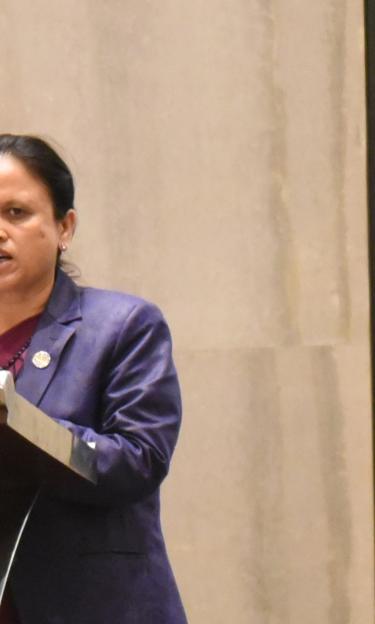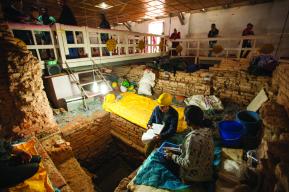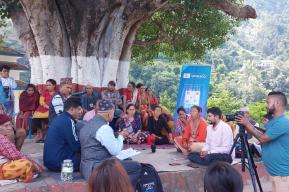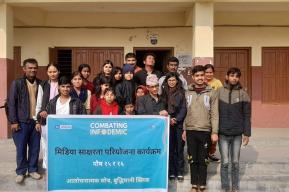“Let me make one thing clear. I won’t be defined by your labels. I won’t be confined by your expectations. I won’t be silenced by your opinions. So, call me whatever you want; for I am more than the words you use. I am a human, complex and true.”
Jalasa Sapkota, a visually impaired girl, stood before a diverse audience of 150 people - lawmakers, human rights defenders, media experts, journalism professors and students - and recited powerful poetry that challenged the labels, expectations, and opinions imposed upon her. Her words set the tone for the 30th anniversary of the World Press Freedom Day celebration, organized by the UNESCO and UN Resident Coordinator Office in Nepal in partnership with the National Human Rights Commission, the Federation of Nepali Journalists, and the Central Department of Mass Communication and Journalism of Tribhuvan University.
The day-long event featured informative and stimulating discussions on the crucial role of press freedom in promoting and protecting human rights, aligning with this year's theme, "Shaping a Future of Rights: Freedom of Expression as a Driver for all Other Human Rights". The celebration was filled with thought-provoking presentations, inclusive art exhibitions, and inspiring performances, including a wheelchair dance and a cultural Sekela dance.
In today's digital era, the rise of misinformation, disinformation, and hate speech has become a growing concern. Sadly, violence against journalists continues to pose a major threat, with journalists facing daily risks of being killed or threatened. Women journalists, in particular, have been subjected to online harassment, cyberstalking, rape threats, and trolling, which is a serious violation of their human rights. During the event, UN Resident Coordinator Ms Hanaa Singer Hamdy shed light on the gravity of the situation, stating that the crackdown on press freedom and threats to the safety of journalists is a global phenomenon. She expressed concern about the increasing trend of misinformation, hate speech, and attempts to regulate content through various policies and acts, which often compromise media freedom.
The Windhoek Declaration, signed on May 3rd, 1991, is considered a benchmark for ensuring press freedom around the world. “In the years that followed there was an optimism and a promise of progress as countries across the world put in place reforms for more open media. Unfortunately, much of this optimism has eroded in the years since.” Therefore, on the 30th anniversary of the declaration, the Windhoek +30 Declaration was made in 2021 to reaffirm the fundamental principles of press freedom and the need for urgent action to secure it as a public good across countries. “As Nepali media is rapidly evolving in a digital age, I call on all the relevant stakeholders to collaborate to ensure Nepal leads the way in creating press freedom and safety of journalists in a digital age a reality,” said Hamdy.
The program also gave a voice to people with disabilities, showcasing their talents through various performances that highlighted the power of creativity and expression in promoting human rights and inclusion.
Although the constitution of Nepal includes provisions for a free press, there is still a need for the formulation and implementation of laws to support it. To achieve this, the ministry is committed to creating relevant public information laws and enhancing the capabilities of the press through the establishment of a training institute.
Presentation by the Press Council Nepal
Bal Krishna Basnet, the chairperson of the Press Council Nepal, took the stage to shed light on the council's crucial role in protecting press freedom. His presentation centered around the code of conduct that journalists must abide by, and the growing prevalence of new media which has brought with it a unique set of challenges to the field of journalism.
During the event, one participant, Sujan, who works in photojournalism and is hearing-impaired, posed an insightful question to the presenter. He emphasized that freedom of expression is a basic right for all and asked for insights on how individuals with disabilities can exercise this right. “How can the organization like the Press Council Nepal, and the Federation of Nepali Journalists ensure inclusion regarding the accessibility of information provided by the press?,” he asked.
His question highlighted an important issue that is often overlooked and prompted a thoughtful and informative discussion on how to ensure that everyone, regardless of their abilities, has access to the information they need.
Panel Discussion on Freedom of Expression for enabling information as a public good
The panel discussion convened a diverse group of human rights advocates, media professionals, parliamentarians, and legal experts. They talked about the situation of press freedom, human rights, rights of journalists and connected it with the gaps in the country’s laws.
Aarati Raya, one of the participants, drew attention to the crucial role of media consumers in the proliferation of misinformation, disinformation, and hate speech. She asked, "How can we promote media, cyber, and digital literacy among consumers to ensure that freedom of expression is not misused?"
Art performances
In addition to the informative discussions, the program also featured some captivating paintings centered on the theme of freedom of expression. These artworks were created by participants of the Media and Information Literacy art workshop, organized earlier in the year by the UNESCO Youth Media Champion. Furthermore, the event included a mesmerizing performance by a group of physically disabled women who expressed themselves through the art of wheelchair dance, accompanied by music. Additionally, the audience was treated to a traditional cultural dance known as Sakela, practiced by the Kirat Rai community in the eastern region of Nepal.
The World press Day event was very important for personal growth as well as for great networking with amazing individuals around. The panel discussion, in particular, was an insightful session that I thoroughly enjoyed.
I have learned a great deal from this program, particularly about the significance of not only having a free press, but also an inclusive one that serves as a voice for the voiceless. The most impactful part of the program was the session featuring Sumana Shrestha. She shed light on the transformative potential of the IT sector when approached responsibly.
In response to a question about the program's feedback, she said, “I deeply appreciate the inclusive approach taken in organizing this event but I must express my concern regarding the absence of representation of the disability community on the panel discussion.”






